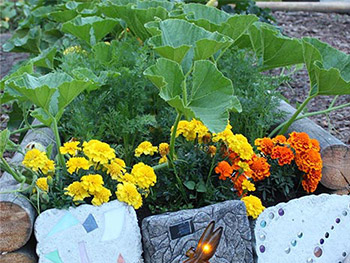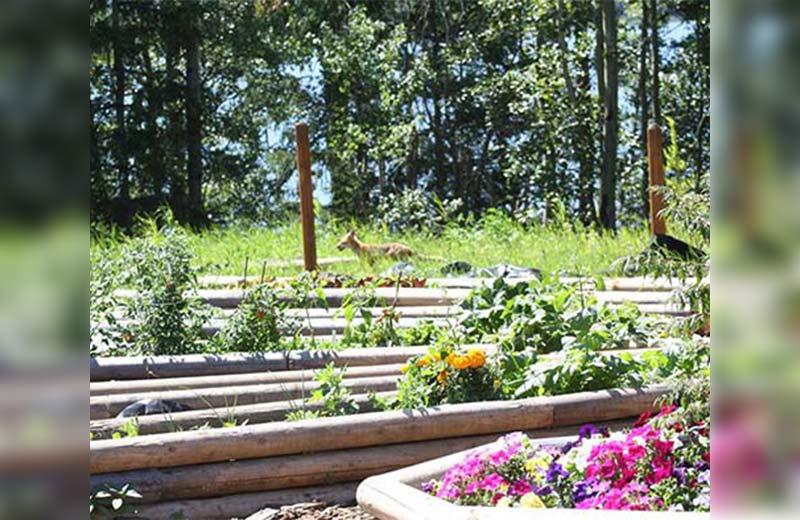Northern Health's IMAGINE Community Grants provide funding to a variety of groups with projects that make Northern communities healthier. Our hope is that these innovative projects inspire healthy community actions where you live! Check out the story below and read more IMAGINE Community Grant stories.
The Healthy Minds Peer Support group in Fort St. James offers a safe and confidential venue for those impacted by mental and emotional health issues. The group aims to break isolation, promote healthy lifestyles, support integration into the community, and reduce stigma around mental health concerns. Healthy Minds Peer Support also organizes public awareness campaigns with speakers from the RCMP and local mental health practitioners. They meet every Monday at 7 pm at the Stuart Lake Hospital and welcome everyone to join them.
At first glance, one might ask how a community garden fits into this vision. For facilitators and Mental Health and Addictions Advisory Committee members Greg Kovacs and Sandi Taylor, there are so many worthwhile connections between a community garden and mental wellness. They highlighted these when they first proposed this project to the IMAGINE Community Grant program:
A healthy diet of fruits and vegetables and physical activity can reduce the risk of heart disease, stroke, cancer, and mental health problems. We also know working with the soil, planting, and harvesting is therapeutic and conducive to those on their road to recovery and healthy living principles. Community gardens have proven successful in numerous communities worldwide in providing valuable educational tools and skills acquisition for those most in need.
For Kovacs and Taylor, there was a crucial social piece to this project, too:
Isolated mental health clients gain socialization skills, confidence, and practical life-affirming experience. [The garden] is a great way to keep fit, socialize, and an excellent form of therapeutic exercise for participants.
After a successful IMAGINE Community Grant application in 2015, Kovacs, Taylor, and the rest of the Healthy Minds Peer Support group got to work.
How did the project go? Kovacs and Taylor provided an inspiring update:
This project exceeded expectations on many levels. The construction of the garden space involved over 50 volunteers, from children to seniors across all socioeconomic and racial divides. Together, we logged over 1,500 volunteer hours. This garden has provided socialization opportunities [and] improved the mental and physical health of many community members. Through these interactions, awareness of mental health, physical health, and environmental health has been raised.
Two classes from David Hoy Elementary School helped in the construction and planting of garden beds. The grade 9 woodworking class from the high school built two flower garden beds for us. We also had involvement from adult mental health service users. Friendships were made, and a sense of community bonding was achieved. We were able to produce many pounds of fresh, organic vegetables – from lettuce to corn and peppers. Also, with seven local newspaper articles on the garden project, mental health and community gardening has been highlighted, and these topics have become common conversations around all community events. Raising awareness of mental health is the first step in reducing, and eventually eliminating stigma around it.
One of the most important goals of sharing projects supported by IMAGINE Community Grants is the opportunity to share the lessons learned from different projects. Everyone who has been involved in a big project – whether it's a personal home renovation, organizing a local sporting event, or getting a project off of the ground in a community – knows that it's not always rainbows and sunshine! With the benefit of hindsight, Kovacs and Taylor shared what they learned:

All in all, it has been a very positive experience. There were, however, some challenges. It was difficult to get people involved in the actual construction. A lot of skilled labour was required, and in short supply ... Being the project lead, it was difficult at times to gauge the skill level of volunteers … Volunteers often require close supervision. It is important to allow people some freedom, while discerning what projects they can succeed at. We could have used some more help with the administrative duties … If we undertook this type of project in the future, we would not make funding applications, or commitments, until we had people committed to certain duties.
The takeaway for Kovacs and Taylor
The successes greatly exceeded the challenges. We have been approached by many strangers complimenting the work our group is doing. The word is out, and most of our beds are already reserved for the 2016 planting season. This garden is poised to become a new standard in community gardening. With a focus on aesthetics, as opposed to just food production, our garden has become a popular lunch, and socialization place for local workers and all community members. There is a lot of pride in this community garden. It is known as a very tranquil and serene sanctuary, overlooking the beautiful Stuart Lake. Seeing the faces of people who see the garden for the first time—priceless! … Be prepared to get projects off the ground with a few dedicated and imaginative people, and once things begin to take shape, others will join.
The impact of the Healthy Minds Community Garden and the Healthy Minds Peer Support group really comes to light when you ask Kovacs and Taylor for one thing that they want to share about the project:
It is extremely difficult to list only one, as there are so many! … The greatest benefit, among many, is that of community bonding, or socialization. People that would not normally mix are working, laughing, and talking with each other. With so many phenomena dividing people in society today, the garden is a unifying space. One participant in particular, who wishes to remain anonymous, has been suffering from a life-threatening illness and has been isolating for over a year. We managed to get her out to the garden one day, and that resulted in her riding a bicycle to the garden every weekend to help and mostly just to socialize. She has reserved a garden bed for 2016. Largely as a result of stigma, many people experiencing mental health issues suffer in silence. Our objective is to reach as many of these people as possible, and the Healthy Minds Community Garden is accomplishing this. We also have to mention that the health benefits of growing and eating whole foods has not been lost on those participating in the garden.
Clearly unable to contain their excitement, pride, and desire to share more about the community garden, Kovacs and Taylor's “one thing” continues to a list of community partners:

The involvement of the school kids, and the excitement in their eyes when they see what they have grown, is priceless. We believe that many of those kids will continue to garden and eat healthy throughout their lives. We also have to mention that the school this year is going to plant three beds as a result of the success of the program.
We have also reserved a bed for the Key Resource Centre in Fort St. James, and two beds are reserved for a local women's wellness group. So far, we have two beds reserved for seniors as well. We have built two extra height beds for people with mobility issues. The entire garden is wheelchair accessible. We strongly believe that this garden will continue to grow and be of great benefit to all in this small community.
This project is, beyond any reasonable doubt, a resounding success.
IMAGINE Community Grants
Do you have ideas to promote social connections, reduce stigma, boost healthy eating, and make your community healthier? Start gathering your team and brainstorming your project – the next round of IMAGINE Community Grants will start September 19, 2016.
IMAGINE Community Grants provide funding to community organizations, service agencies, First Nations bands and organizations, schools, municipalities, regional districts, not-for-profits, and other partners with projects that make Northern communities healthier. We are looking for applications that will support our efforts to prevent chronic disease and injury, and improve overall well-being in our communities. The next call out for IMAGINE Community Grants will be September 19, 2016.














Comments